Front door ecological farm, back door sewage is discharged directly! Farmhouse becomes a blind spot of pollution supervision
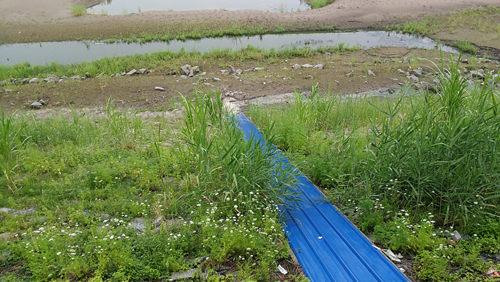
An ecological farm built on the river bank, in the form of quadrangle dwellings, has green grass in the yard, and a sewage pipe is connected from the kitchen behind the yard to the river. Reporter Bai Tiantian photo
Imagine a family driving to an ecological farm far away from the city on a weekend, experiencing country life and tasting delicious farmhouse food. How do you feel when we leave comfortably, but leave behind the black and smelly wastewater that is directly discharged into farmland and rivers?
Nowadays, all kinds of farmhouses and ecological farms are blooming everywhere, becoming the hot spots of rural tourism. Half-monthly reporters have recently conducted field investigations in many places and found that many farmhouses have outstanding problems of "front door ecology and back door sewage discharge", and pollution prevention and supervision are lagging behind. Some farms that flaunt "ecology" are not worthy of the name, and the sewage discharge place has become a stinking ditch, and the lampblack discharge place has become a "black land".
Ecological farms are not necessarily "ecological", and waste water and oil are discharged at will.
Pastoral scenery, green ecology, native dishes … … This is a "propaganda language" played by many farmhouses and farms. Recently, a semi-monthly reporter walked into an ecological farm built on a river bank in a county in Dongting Lake area. The farm is a courtyard house with more than 10 boxes, green grass in the yard, cool breeze on the terrace near the river and pleasant environment. Walking through the yard to the back of the kitchen, you can see a 4-meter-long, covered with blue colored steel tiles, and some hidden pipes lead directly into the river. The water flowing out of the pipe is obviously dirty.
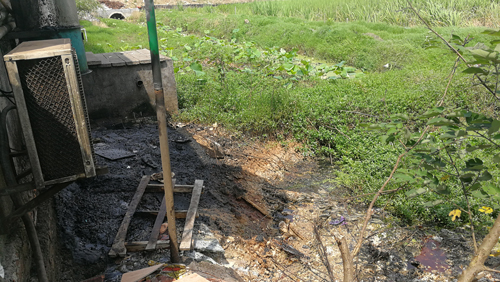
On a farm around a county town, kitchen sewage and waste were discharged into a small pond for a long time, filled with black or yellow wet and sticky dirt, next to a rice field and an irrigation canal. Reporter Bai Tiantian photo
In this regard, the farm staff disapprovingly said: "The sewage in the kitchen is discharged like this, and it is washed away as soon as it rises."
A farm close to a county town, the scene of sewage discharge is even more shocking. When the reporter asked the farm owner for half a month, how to discharge the sewage? The female boss’s answer is: "We discharged into the sewer." But when the reporter went to the back of the kitchen, a bad smell came head-on, and I saw a small pond next to it, full of black or yellow wet and sticky dirt. On one side of the pond, there are paddy fields and an irrigation canal — — It turns out that this is the so-called "sewer".
In another mountainous town, the annual spring flower viewing season is the tourist peak season, and tourists come here in an endless stream. A farmhouse named "Central Local Restaurant" has a reception capacity of more than 20 tables. Half a month, the reporter saw that the oil pollution, dishwashing water and toilet sewage of this farmhouse lampblack machine all merged into the next canal. The farmhouse is surrounded by farmland, and the early rice is growing green. These blackened wastewater turns into irrigation water and flows into the fields.
Similar pollution phenomenon is not a case. A person in charge of the environmental protection department said frankly that in the current rural environmental pollution, the wastewater, exhaust gas, lampblack and solid waste from farmhouses and farms are important sources of pollution. "Many farms are directly discharging pollutants in order to maximize their interests."
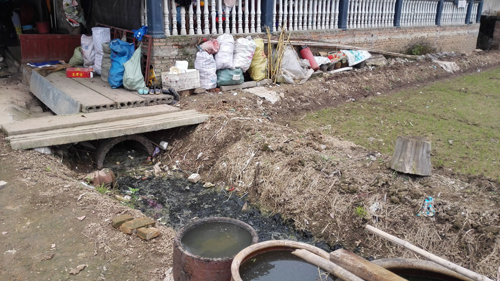
A farmhouse that focuses on "local dishes", the kitchen waste water is directly discharged into the canal behind the house, forming a black greasy dirt for many years. Reporter Bai Tiantian photo
Shuguang Environmental Protection is a non-governmental environmental protection public welfare organization in Hunan. This year, they launched a survey on the water pollution in farmhouses. Tan Yongchao, director of water project, said that at present, his team members have visited more than 20 farmhouses on the spot and found that toilet sewage is generally treated by septic tanks, while most kitchen wastewater is "directly discharged".
In April, Shuguang Environmental Protection conducted a sampling inspection of wastewater samples from the outlet of an ecological farm around Changsha. The test items included suspended solids, chemical oxygen demand, total phosphorus, total nitrogen and ammonia nitrogen. According to the test report, if compared with the pollutant discharge standards of urban sewage treatment plants, many indicators of the samples seriously exceed the standard. For example, the chemical oxygen demand (COD) is 373 mg/L, which is more than seven times that of Grade A standard and three times that of Grade III standard.
"I pollute but I don’t control it", and environmental protection can only rely on "awareness"?
During the tourist season or weekends and holidays, some farmhouses and ecological farms are bursting with popularity, and operators earn a lot of money. But when it comes to environmental protection, they often "have nothing to do with themselves and hang high", and the prevention and control of pollution can only rely on "awareness".
In the interview, farmhouse operators generally showed two typical mentalities. One mentality is that "the law does not blame the public." An eco-farm owner pointed to the pipeline leading directly to the village canal and said without hesitation: "Sewage is directly discharged into the canal without treatment. In rural areas, everyone does this and it has no impact."
One mentality is "I pollute and the government pays". After a half-month talk, reporters asked a number of operators and found that they generally lacked the concept of "who pollutes, who governs", and thought that pollution control is a matter for the government. The owner of the farm near the county said that it would cost thousands of dollars to remove waste water and waste oil once, which was not cost-effective, and should be paid by the government. Before the village dredged the canal, she didn’t clean the sewage pond of her farm by the way, and she still complained about it.
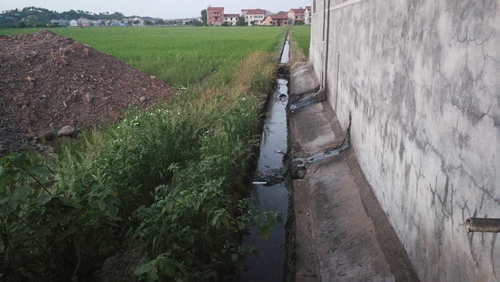
In a village famous for enjoying flowers in spring, the oil pollution, dishwashing water and toilet sewage of a farmhouse lampblack machine in rice fields are "three in one", and the blackened wastewater is directly discharged into the irrigation canal. Reporter Bai Tiantian photo
On the other hand, some places lack restraint and supervision on the pollution of farmhouse music. A person in charge of the local environmental protection bureau said that in the past, rural environmental improvement focused on "visible garbage" and carried out cleaning projects for villages, schools and roads, but not enough attention was paid to the "root cause" of air, water and soil pollution. According to the regulations, environmental impact assessment should be carried out in the construction of ecological farms, but the local area is basically blank.
In 2017, the Environmental Protection Bureau of Linyi County, Hunan Province investigated an ecological farm project and found that it was built without going through the EIA approval procedures, put into operation without supporting pollution control facilities, and made administrative penalties. However, similar cases are rare. Most of the farm operators interviewed by reporters in half a month said that they did not conduct environmental assessment, and the inspection of environmental sanitation rarely involved smoke exhaust, drainage and exhaust.
Relatively speaking, star farms have done a good job in environmental protection. In a five-star farm with an area of more than 80 mu and an investment of tens of millions, facilities such as sewage purification tanks and fume purifiers are readily available, designed and installed by professional environmental protection companies. The owner of the farm said that the star rating has clear environmental protection requirements, so they conducted an environmental assessment and built pollution control facilities.
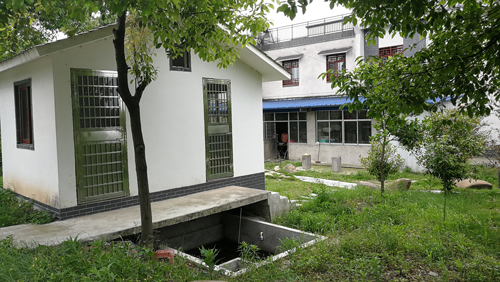
A five-star farm has done a good job in environmental protection, and built facilities such as sewage purification pond and lampblack purifier. Reporter Bai Tiantian photo
Farmhouse "blooms more", and environmental protection should also "keep up step by step"
With the rise of rural tourism and global tourism, farmhouses and ecological farms are showing the trend of "multi-point flowering". The reporter learned from the semi-monthly talk that in recent years, in key areas such as urban suburbs, reservoir wetlands and scenic spots, farmhouse music is gradually being brought into the scope of supervision and rectification, and environmental pollution problems have begun to spread to some remote counties and townships and emerging rural tourist spots.
Liu Shuai, director of the Supervision Department of the Environmental Protection Committee of Hunan Provincial People’s Congress, said that at present, pollution prevention and control of farmhouse music is well done in developed areas such as the Yangtze River Delta and around big cities, but it is still weak in many other places, which should be further paid attention to and strengthened management.
Liu Shuai believes that it is necessary to explore rural pollution control modes according to local conditions, such as building "upgraded versions" of constructed wetlands and septic tanks in villages with scattered populations. In the construction and operation of farmhouse music, the environmental impact assessment system should be implemented at the front end, and the departments of agriculture and tourism should be combined at the end to strengthen environmental law enforcement.
Wang Gaoliang, deputy director of the Environmental Protection Bureau of Hengyang County, said that this year, the local environmental protection department will focus on rural environmental improvement, requiring farmhouses to standardize the installation of lampblack and sewage treatment facilities, and promote the construction of four sewage purification ponds and "constructed wetlands+oxidation ponds" suitable for rural areas. The basic requirement is that they cannot be discharged directly. If the farmhouse fails to meet the environmental protection requirements, a rectification letter will be issued and penalties will be imposed.
Liu Hongli, Director-General of Shuguang Environmental Protection, suggested that the principle of "whoever pollutes should treat" should be adhered to for farmhouses and ecological farms. At the same time, the government can also introduce guiding measures, like remediation of aquaculture pollution, and give certain subsidies to the construction of pollution control facilities according to the scale of farmhouses, starting with newly-built farmhouses and star-rated farms, and then gradually solving the problem of stock pollution. (Talk to reporter Bai Tiantian for half a month)